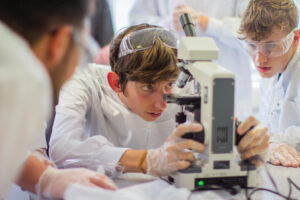From Monday, September 22, all students must ensure they have a valid, working pass for the bus service they are using. Student ID cards will no longer be accepted on board services. Full instructions can be found on our Transport page.
Veterinarians
Veterinarians diagnose and treat animal injuries, diseases and disorders, and advise on preventative action. They may work in practices, specialising according to their location in either a rural or urban area, or in the public sector or associated industries such as pharmaceuticals, food production or drug regulation.
view coursesAbout this Career
£39,895
New workers start around £14,727.76. Normal pay is £39,895 per year. Highly experienced workers can earn up to £66,799.91.
13
Job counts include both employed and self-employed persons in Cornwall, and do<br /> not distinguish between full and part-time jobs.
Daily Tasks
- Maintains records, raises and forwards reports and certificates in compliance with current legislation.
- Carries out expert witness work and undertakes teaching of veterinary students.
- Performs ante-mortem inspection of animals destined for the food chain, and animal post-mortem examinations.
- Performs tasks relating to food safety policy, regulation of veterinary drugs, quality control of veterinary products.
- Euthanises old, sick, terminally ill and unwanted animals.
- Investigates outbreaks of animal diseases and advises owners on feeding, breeding and general care.
- Administers local or general anaesthetics and performs surgery.
- Inoculates animals against communicable diseases.
- Examines animals, diagnoses condition and prescribes and administers appropriate drugs, dressings, etc., and arranges or undertakes any necessary x-ray or other tests.
Skills Employers Are Looking For
Skills
Job postings
Available Courses

A Level Environmental Science

A Level Biology

BTEC Level 3 National Extended Diploma in Applied Science (Biomedical Science)





